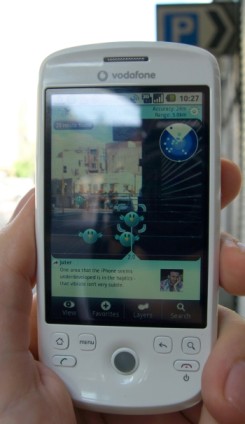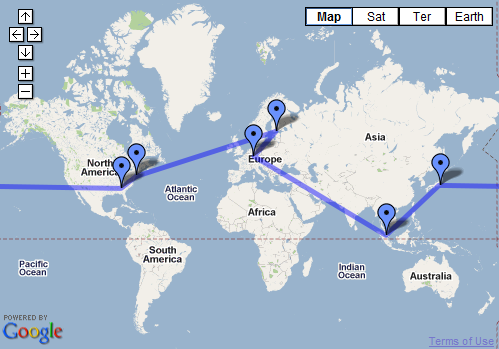 Yesterday I was sitting on a bus to work and I saw a guy in front of me browsing through a Twitter feed on his N97 Mini. As it just happened, I was also deep in the Twitter world with my mobile. I couldn’t resist the temptation of spying on his Twitter handle and then looking it up. Suddenly I found myself staring at the world through the eyes of a perfect stranger who just happened to share the same mass transit ride to the office. Which people, companies and celebrities he was following, how he described himself in the profile, what he had to say to the world, what kind of friends he had following him, when he had registered to Twitter in the first place, etc.
Yesterday I was sitting on a bus to work and I saw a guy in front of me browsing through a Twitter feed on his N97 Mini. As it just happened, I was also deep in the Twitter world with my mobile. I couldn’t resist the temptation of spying on his Twitter handle and then looking it up. Suddenly I found myself staring at the world through the eyes of a perfect stranger who just happened to share the same mass transit ride to the office. Which people, companies and celebrities he was following, how he described himself in the profile, what he had to say to the world, what kind of friends he had following him, when he had registered to Twitter in the first place, etc.
I felt like such a stalker, but was I really stalking on the poor guy? That is a question I was left pondering as we parted our ways and I moved on to the next list of tweets. Unlike in Facebook and some other networks that are repeatedly making headlines for alleged privacy violations, Twitter truly represents the raw power of untamed social networking applications. There is no privacy, period. The name of the game is in the public broadcasting of your thoughts to an unspecified audience. You don’t need to worry about the concept of a “friend”, as there are no friends in Twitter. You can of course follow other users, but this doesn’t have any impact on what they can see and know about you. It’s all out there and that’s why we love it. That’s what makes it the ultimate sharing platform.
 Let’s take a look into the future for a minute. Layar is a great mobile app for demonstarting the concept of augmented reality. How it works is you launch the AR browser in your mobile phone, point the camera to any direction and Layar will start to append the image with location based information. The usual stuff like restaurants and points of interest are of course available, but you can also view things like geotagged tweets. With the kind of devices we are carrying around in our pockets, it is not at all far fetched to envision a time when you can pull up an augmented reality browser that shows you not just the buildings around you but the names of the people. Think of avatars and @username’s floating on top of the commuters in the traffic jams. The ultimate nude scanner for your mobile?
Let’s take a look into the future for a minute. Layar is a great mobile app for demonstarting the concept of augmented reality. How it works is you launch the AR browser in your mobile phone, point the camera to any direction and Layar will start to append the image with location based information. The usual stuff like restaurants and points of interest are of course available, but you can also view things like geotagged tweets. With the kind of devices we are carrying around in our pockets, it is not at all far fetched to envision a time when you can pull up an augmented reality browser that shows you not just the buildings around you but the names of the people. Think of avatars and @username’s floating on top of the commuters in the traffic jams. The ultimate nude scanner for your mobile?
In the tech or media industry, or any knowledge work intensive line of business, it can no longer be considered bizarre behaviour to be constantly revealing yourself to the world through various social media sites and services. It is rather becoming the norm of what is expected. You better be active on Twitter and Foursquare, otherwise there’s a risk of people thinking you don’t “get it”. Ok, I’m perfectly fine with that trend, with my active sign-up policy to new and exciting web apps.
It is only when the virtual world meets the physical world that things can start to feel ackward. When you meet a familiar avatar in flesh and blood, there cab be a sudden sensation of “OMG, I know too much about you, yet you don’t know anything about me”. The unilateral nature of the relationship can play tricks with your head. People you’ve never met but who you’ve followed through Twitter can start to feel like pseudo celebrities, even though they are likely to be far more average Joe’s in reality than you are, with nothing better to do than posting stuff online 24/7.
I think we’re reaching the uncanny valley of social networks. This concept was originally introduced for describing how in the field of robotics there is a point in which the machines can begin to look too human, thus causing a natural feeling of revulsion in us human beings. In the world of social networks, this same sensation may be achieved by simply knowing too much about the stranger standing next to you. Something that is perfectly cool when sitting in front of your monitor at home can suddenly feel just plain “wrong” when meeting face-to-face. Sharing your life and thoughts is great, but just don’t do it when I’m around. God, us human beings can be such weird creatures at times.
Is there going to be a moment when we simply get enough of revealing ourselves to others? Will the new sociality trend reach its peak and make way for the ultimate privacy backlash, where people simply refuse to give out any personal details to any online service? I’d say that’s an unlikely scenario. Certainly we’ll need to go through the emotions and find the right balance, time and time again, but eventually we’ll have to make it across the valley. With social media and robots alike.


